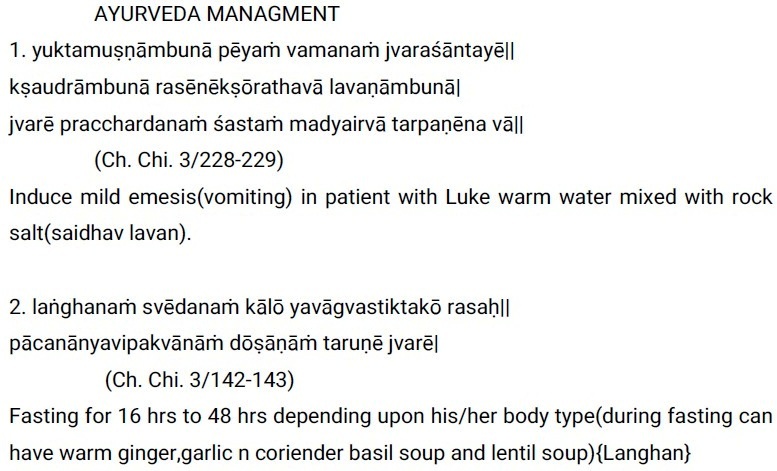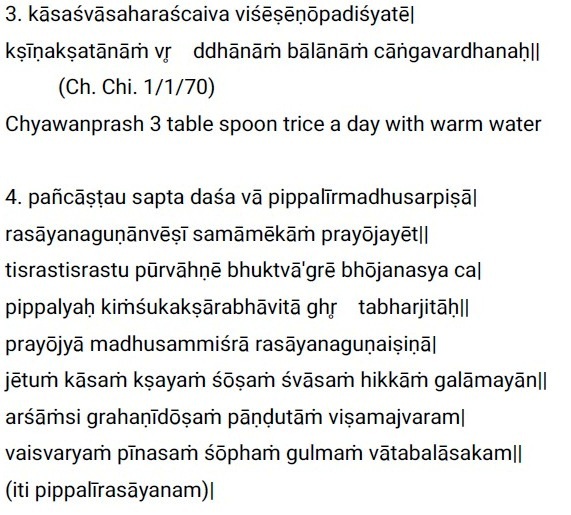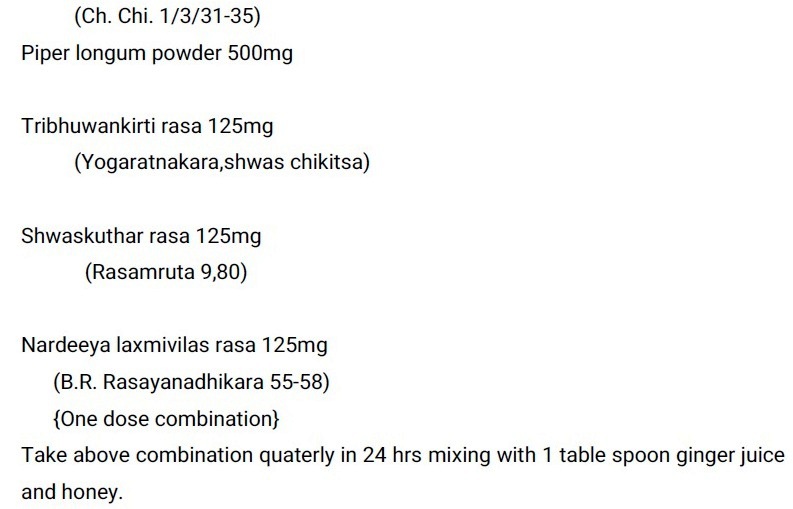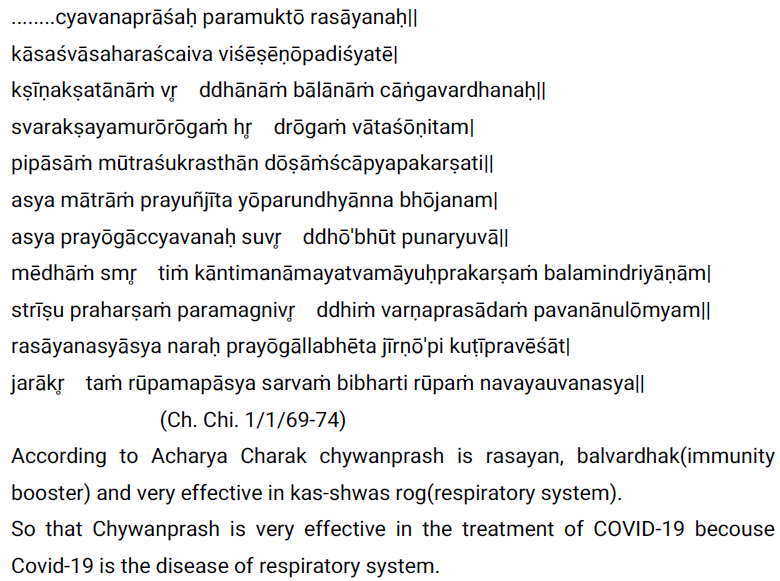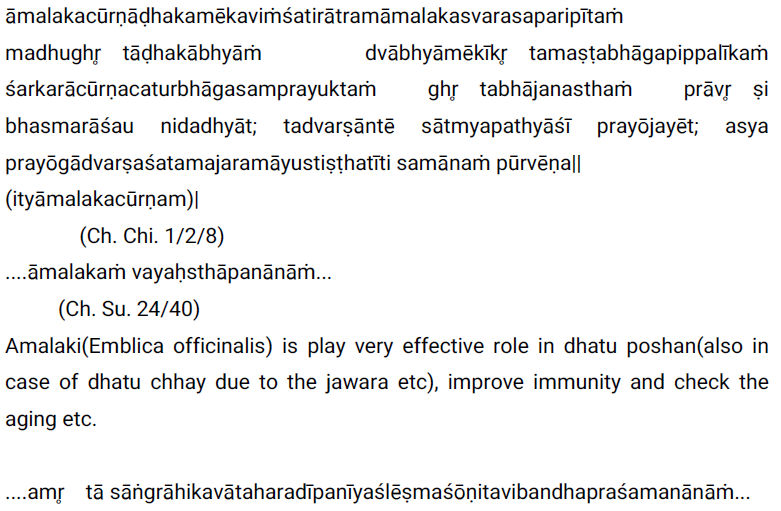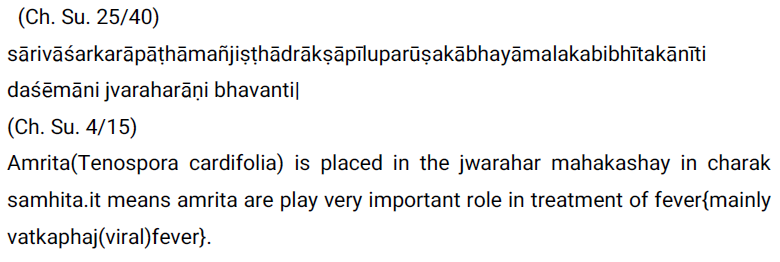|
|
Covid-19 : Scope of Ayurveda to Make Swastha Bharatha
|
Back To List Of Articles
Author : Manik Chand Jaiswal
"Ayurveda is an ancient medical science of
the world"
Ayurveda is considered as one of the oldest of the traditional systems of medicine(TSMs) accepted worldwide. The ancient wisdom in this traditional
system of medicine is still not exhaustively explored. The junction of the rich
knowledge from different traditional systems of medicine can lead to new
avenues in herbal drug discovery process.
The 3rd chapter of Charaka Samhitha Vimana sthana is
Janapadoddhvamsaneeya Vimanam. Janapada means a community and
Udhwamsa means destruction. This deals with the determination of the specific
characteristics of epidemics.
When epidemics is spread in all over areas not any specific are as then it is called
as Pandemic. So that COVID-19 is pandemic.
COVID-19 pandemic is very challenging for all types of medical system including
ayurveda. In this condition our ayurveda system play an important role to
prevention of Covid-19.
Although it is a challenging on the other hand it is a great opportunity for
ayurveda science to prove power of ayurveda in the world.
In any pandemic situations our acharya says that the improve immunity, rasayan
consumption, yoga therapy and environment purification etc.
|
COVID-19 : COVID-19
referred to corona virus disease.
It means COVID-19 a disease which is caused by corona virus.
COVID-19 is a Infectious disease.
Corona viruses are a large family of viruses which may cause illness in animals
or humans. In humans, several corona viruses are known to cause respirator infections ranging from the common cold to more severe diseases such as
Middle East Respiratory Syndrome (MERS)
and Severe Acute Respiratory Syndrome (SARS).The most recently discovered
corona virus causes corona virus disease COVID-19.
|
SIGN and SYMPTOMS :The most common symptoms of COVID-19 are fever,tiredness,dry cough and
shortness of breath.
Some patients may have other common symptoms include cough, loss of
appetite, fatigue, shortness of breath, sputum production,and muscle and joint
pains. Symptoms such a nausea, vomiting, and diarrhea have been observed in
varying percentages. Less common symptoms include sneezing, runny nose,or sore
throat.
These symptoms are usually mild and begin gradually.
|
COMPLICATIONS :In
some, the disease may progress to pneumonia, multi-organ failure,and death.
Neurological manifestations include seizures, stroke, encephalitis, and
Guillain-Barre syndrome.
Cardiovascular-related complications may include heart failure, irregular
electrical activity, bloodclots, and heart inflammation.
In some people,COVID-19 may affect the lungs causing pneumonia. In those
most severely affected,COVID-19 may rapidly progress to acute respiratory
distress syndrome (ARDS) causing respiratory failure, septic shock, or multi organ failure.
Complications associated with COVID-19 include sepsis, abnormal clotting, and
damage to the heart,kidneys,and liver.
|
INCUBATION PERIOD :The incubation period for COVID‑19 is typically five to six days but may range
from 2 to 14 days, although 97.5% of people who develop symptoms will do so
with in 11.5 days of infection.
|
PATHOPHYSIOLOGY :The lungs are the organs most affected by COVID-19 because the virus accesses
host cells via the enzyme angiotensin-converting enzyme2(ACE2),which is
most abundant in typeII alveolar cells of the lungs. The virus uses a special
surface glycoprotein called "spike"(peplomer) to connect to ACE2 and enter
the host cell. The density of ACE2 in each tissue correlates with the severity of
the disease in that tissue and some have suggested that decreasing ACE2
activity might be protective, though another view is that increasing ACE2 using angiotensin II receptor blocker medications could be protective and these
hypotheses need to be tested. As the alveolar disease progresses, respiratory
failure might develop and death may follow.
|
PREVENTION :Preventive measures to reduce the chances of infection include Social distancing,
staying at home, avoiding crowded places, keeping distance from others,
washing hands with soap and water often and for at least 20seconds,practising
good respiratory hygiene, and avoiding touching eyes, nose, or mouth with
unwashed hands. The CDC recommends covering the mouth and nose with a
tissue when coughing or sneezing and recommends using the inside of the
elbow if not issue is available. The CDC has recommended the use of cloth face
coverings in public settings where other social distancing measures are difficult
to maintain, in part to limit transmission by asymptomatic individuals.
|
MANAGEMENT :As Per the World Health
Organization, as of April 2020,there is no specific treatment
for COVID‐19.
People are managed with supportive care, which may include fluid therapy,
oxygen support, and supporting other affected vital organs.
Some medicines like paracetamol, Chloroquine and hydroxychloroquine,
Ritonavir/lopinavir and Ritonavir/lopinavir and interferon-beta are very effective in the treatment.
|
SCOPE OF AYURVEDA :It is a challenging task on the other hand opportunity for ayurveda system to
proof our pathy in the world.
Opportunity like that we have prove our principle with respect to modern
technologies. It means that is the chance for ayurveda system to research (shodh)
at microscopic level, data collection at very huge amount, and the trial of ayshadhi
effects at different climatic environments etc.
Scope of ayurveda in different areas like increasing
vyadhichhamatw(prophylaxis=improve immunity by ayurvedic aushadhi),rasayan
intake, pranayam and yoga,shwas kash Ausadhi,Nasya etc.
|
Another Option is the yog described in Rasaratna Samuchchaya is
containing ras aushadhi like pure parad (pure mercury), shwarn
bhasm(gold), rajat(silver)etc that improve immunity. But Rasaushadhi Containing
Yog are very costly.
Many more yog and aushadhi are present in the ayurveda.
Aware the people improve immunity by Home Remedies which are easily making
by the kitchen spices.
Ministry of AYUSH recommend the following self-care guide lines for preventing
health measures and boosting immunity with special reference to respiratory
health.
1.Drink warm water through out the day.
2.Daily practice of yogasana, pranayama and meditation for at least 30 minutes.
3.Spices like haldi(turmeric),jeera(cumin),dhaniya(coriander)and lahsun(garlic)
are recommended in cooking.
4.Drink herbal tea/decoction(kadha) made from tulsi(basil),dalchini(cinnamon),kali mirch(black pepper),Sunthi(dry ginger) and
munakka(raisin)-once or twice a day.
Add juggery(natural sugar) and/or fresh lemon juice to your taste if needed.
5.Golden milk-half tea spoon of haldi(turmeric) powder in 150ml hot milk one or
twice a day.
6.Nasal application -apply sesame oil or ghee in the both the nostrils(pratimarsha
Nasya) in morning and evening.
7.Oil pulling therapy-take 1 table spoon sesame or coconut oil in mouth. Don't
drink, swish in the mouth for 2 to 3 minutes and spit it off followed by warm water
rinse. This can be done one or twice a day.
|
Ministry of AYUSH has taken initiatives to address the COVID19 pandemic
problem in the country through clinical studies (prophylactic and add-on
interventions) of AYUSH systems. The ministry is also studying the impacts of
AYUSH based prophylactic interventions in high risk population and AYUSH
advocacies and AYUSH measures for prevention of COVID19.
Clinical research studies on Ayurveda interventions as prophylaxis and as an add-
on to standard care to COVID19:Collaborative Clinical Studies as Joint Initiative
of Ministry of AYUSH,Ministry of Health and Family Welfare(MoHFW)and the
Ministry of Science and Technology through Council of Scientific and Industrial
Research(CSIR) with technical support of ICMR.
The Interdisciplinary Ayush R&D Task Force has formulated and designed clinical
research protocols for prophylactic studies and add-on interventions in COVID-19
positive cases through thorough review and consultative process of experts of
high repute from different organizations across the country for studying four
different interventions viz.Ashwagandha,Yashtimadhu,Guduchi+Pippali and a
polyherbal formulation(AYUSH-64).
Ashwagandha for the prophylaxis Against SARS-COV-2 in subjects with
increased risk during the COVID 19 Pandemic: A comparison with
Hydroxychloroquine in the health care providers and Effectiveness of Ayurveda
Formulation as an adjunct to' Standard of Care' for the Treatment of Mild to
Moderate COVID-19: A Randomized, Open Label, Parallel Efficacy, Active Control,
Multi-Centre Exploratory Drug Trial.
|
CONCLUSION :In this process we have to give ayurveda Ausadhi at all over the
India, provide
many types of prevention methods, improve immunity, mentally fitness by the help
of yoga and pranayam etc.
After all we will be improve indian health at that COVID-19 pandemic by the
ayurveda system to make Swawtha Bharat.
And we have collect all the data and analysis at all aspects. These are the
enough for the proof our ayurveda principle at world level.
|
References :
Sharma PV Charaka Samhita of Acharya Caraka, Chaukambha
Orientalia Publications, Varanasi.
Pt. Kashinath Shastri Carak Samhita of charakdridhbalabhyam
pratisanskrita, Chaukhambha bharti Academy, Varanasi.
Ambikadatta Shastri Susruta Samhita of Maharshi Susruta edited
with Ayurveda-tattva-sandipika, Chaukhmbha Sankrit
Sansthan,Varanasi.
Dr.Shailja Srivastava Astanga Hridayam of
Srimaddvagbhattvirchitam
Astagahridayam,Chaukhmbha Orientalia,
Varanasi.
Murthy, Srikantha KR AshtangaSamgraha of Acharya Vagbhata,
Chaukambha orientalia, Varanasi.
Covid-19 India Available from
www.mohfw.gov.in.
World health organization. Clinical management of severe acute
respiratory infection (SARI) when covid-19 disease is suspected.
Chen N, Zhou M, Dong X, Qu J, Gong F, Han Y, et al. (February 2020).
"Epidemiological and clinical characteristics of 99 cases of 2019
novel corona virus pneumonia in Wuhan, China: a descriptive study". Lancet.
"Q&A on corona viruses (COVID-19)". World Health Organization. 17 April 2020.
Clinical Trial Registry of India. ICMR-National Institute of Medical Statistics.http://ctri.nic.in/Clinicaltrials/login.php
www.ayush.gov.inIn general Guidelines For
Clinical Evaluation Of
Ayurvedic Interventions.
|
Author : Manik Chand Jaiswal
Email : manikchandjaiswalpintoo@gmail.com
Mobile No. : 7317415300
College : Government Ayurvedic College,Varanasi, Uttar Pradesh.
|
|
Manuscripts are invited for next Issue at ijapc.com
Features
Herbs and Medicinal Plants
|

